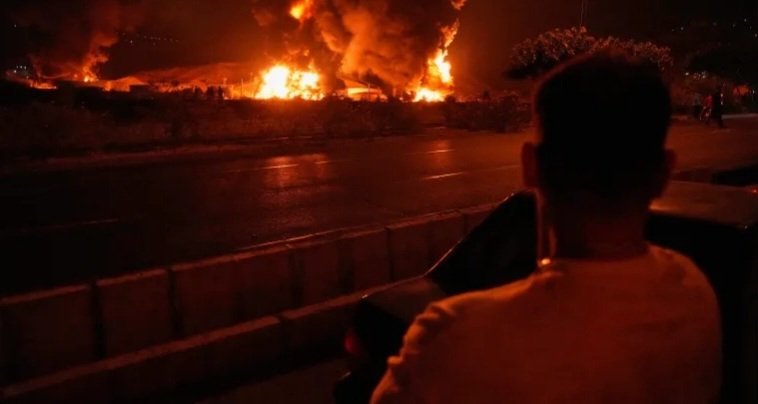Israel-Iran tensions spark security concerns in Pakistan

As the Israel-Iran conflict intensifies, Pakistan is grappling with potential security repercussions, especially along its southwestern border with Iran. The government is carefully navigating diplomatic channels while taking precautionary security steps, fearing that the crisis could inflame regional instability and domestic unrest.
Earlier in January 2024, Pakistan and Iran briefly exchanged missile fire targeting what each side claimed were separatist elements. Despite this past confrontation, Islamabad quickly condemned Israel’s recent airstrikes on Iran's nuclear facilities and the assassination of high-ranking Iranian officials. The Ministry of Foreign Affairs labeled the Israeli actions as blatant violations of sovereignty and urged the global community to intervene.
Rising Tensions and Regional Fallout
The ongoing conflict, now in its sixth day, has led to the deaths of over 220 Iranians and left thousands injured, while Iran’s retaliatory strikes have caused over 20 Israeli fatalities and widespread damage. Amid this, Pakistan — which shares a 905 km border with Iran through Balochistan — has sealed five key border crossings since June 15 and repatriated hundreds of citizens, including students and pilgrims.
Officials in Taftan, a key border town in Balochistan’s Chaghi district, reported a return of around 500 pilgrims and 45 students. The closures reflect Pakistan’s growing anxiety about unrest spilling over from Iran, especially in the already volatile Balochistan province.
Longstanding Complexities
Pakistan and Iran have historically accused each other of sheltering insurgent groups responsible for attacks across the shared border. The January 2024 strikes by Iran into Balochistan targeted Jaish al-Adl, a Sunni separatist group, prompting a swift Pakistani counterattack against alleged Baloch insurgents in Iran.
Despite past tensions, both countries have since resumed diplomatic engagement. Pakistani Foreign Minister Ishaq Dar recently stated in parliament that Tehran is open to negotiations if Israel halts its aggression — a message Pakistan has conveyed to other states in hopes of facilitating peace talks.
Strategic Caution in a Shifting Landscape
While Pakistan expresses willingness to mediate, analysts remain skeptical of its capacity or appetite to play a central role. Umer Karim, a Middle East analyst, noted Islamabad’s balancing act — keen to avoid deeper entanglement while also rebuilding ties with the U.S., Israel’s main ally.
“Pakistan may publicly support dialogue, but it’s unlikely to wade too far into the conflict,” he said.
Minister of State for Interior Talal Chaudhry echoed the concern, urging global powers to act swiftly to prevent further devastation like that seen in Syria, Iraq, and Libya.
Balochistan: The Core Security Risk
Pakistan’s main worry lies in Balochistan — a mineral-rich but politically sensitive region long plagued by separatist unrest. Groups like the Balochistan Liberation Army (BLA) and Balochistan Liberation Front (BLF), some of whom operate across the Iran border, have sought greater autonomy or independence.
Security experts warn that the ongoing conflict could push militants from Iran into Pakistani territory, exploiting the porous frontier. Researcher Abdul Basit noted that border closures are part of a strategy to control potential infiltration and maintain stability.
Lessons from Afghanistan
Pakistan’s response is also shaped by past experiences with Afghan refugees. Decades of hosting Afghan migrants following regional conflicts have strained resources and security. Having expelled nearly a million Afghan nationals since 2023, Islamabad is wary of a similar refugee crisis emerging from Iran.
“The long, porous border and deep social ties between communities on both sides make this a real concern,” Basit said.
Israeli Military Reach Raises Alarm
Beyond refugee and militant threats, Islamabad is uneasy about Israel’s expanding military reach. Claims by Israeli leaders of air superiority over Tehran are especially troubling for Pakistan, which fears that Israeli surveillance or strike capabilities could eventually extend toward its western border.
“Such dominance would destabilize the regional security balance,” said Karim.
Domestic Political Risks
Security analyst Ihsanullah Tipu Mehsud pointed out that openly siding against Iran could also ignite sectarian tensions within Pakistan, which, while majority Sunni, has a sizable Shia population.
“Past sectarian violence has left deep scars. Any misstep now could reignite those divisions,” Mehsud said.



